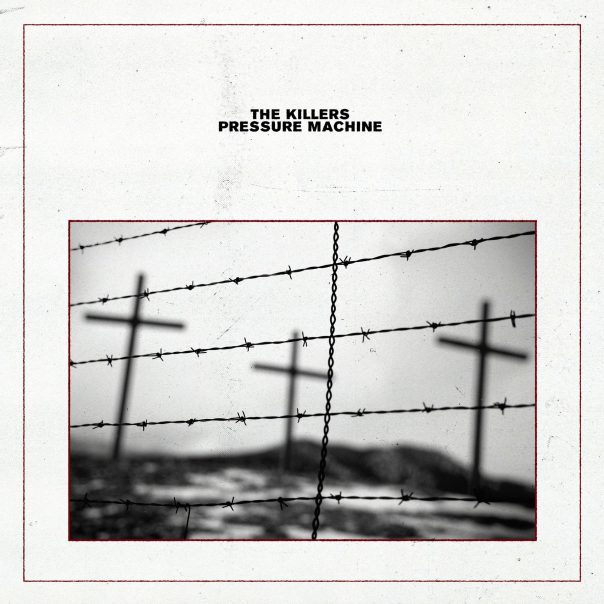ALBUM REVIEW: The Killers explore small town despair on ‘Pressure Machine’

“Pressure Machine” by The Killers.
If you’re a millennial entering your 30s, stumbling upon facts that make you feel old is likely becoming a regular occurrence. Here’s a fun one: The Killers recently celebrated their 20th anniversary as a band.
Pressure Machine
The Killers
Island, Aug. 13
7/10
Rapidly rising in popularity after their 2004’s Hot Fuss, The Killers have continuously toured and released music, most recently in 2020 with Imploding the Mirage. Due to COVID-19, the band postponed its worldwide tour to promote that album. But Brandon Flowers and company didn’t spent their free time sitting idly—instead they wrote and recorded their seventh studio album, Pressure Machine.
With the return of guitarist Dave Keuning, the album features three-fourths of The Killers’ full 2004 lineup with Flowers and Ronnie Vannucci, Jr. on drums. Despite this, Pressure Machine is a bit of a departure from their typical oeuvre. The concept album was inspired by and centers on the people of Nephi, Utah, the town where Flowers lived during his formative years.
An hour south of Salt Lake City and with a population of around 5,300, the town was settled by Mormon pioneers in the 1850s and is named after Mormon prophet Nephi. All of this is important context for understanding the album, which features recordings of Nephi citizens describing (and narrating) the often bleak state of life in their declining town.
Each song is a self-contained vignette, which, taken together, tells the story of what it’s like to live in Nephi. Focusing on themes of rural small-town decline like opioid use, unfulfilled dreams and feelings of religious disenchantment, the album is one of the band’s most lyrically cohesive.
Flowers has described Pressure Machine as “full of songs that would have otherwise been too quiet and drowned out by the noise of typical Killers records.” This definitely rings true. Tracks “Quiet Town,” “Runaway Horses” and “The Getting By” are the quietest on the album and offer the largest departure from The Killers’ typical sound.
Featuring Phoebe Bridgers, “Runaway Horses” is a standout track with country-like inflections. Flowers and Bridgers exchange lyrics and harmonize beautifully while speculating on the inner-life of women in Nephi: “Small town girl/ Put your dreams on ice/ Never thinking twice/ Some you’ll surely forget/ But some you never will.”
“Quiet Town” opens with a recording from a Nephite noting how “every two to three years the train kills somebody,” and how “the train is a way to find your way out of this life.” It’s a fitting introduction for a song about a young couple killed by the train. Much of the album is highly evocative of John Mellencamp, nowhere more so than here, which is essentially a sadder version of Mellencamp’s “Jack and Diane.”
The train is revisited on album closer “The Getting By,” which features a lonely train call in the outro. While on previous songs Flowers immerses himself in the stories he sings, in “The Getting By” he breaks the fourth wall. He provides commentary on the relationship between the townsfolk’s economic position in life (“Still I know some/ Who’ve never seen the ocean”) and their religious beliefs (“But they’ve got their treasure/ Laying way up high/ Where there might be many mansions/ But when I look up/ All I see is sky”).
Other tracks on the album, while more subdued than typical Killers’ fare, still retain their signature sound. “In The Car Outside” is the loudest and most decidedly “rock” song on the album. Fast-paced with Flowers’ voice reaching peak angst, and about an ill-fated love affair, it will be sure to please longtime fans.
